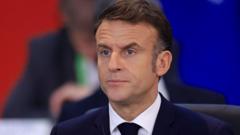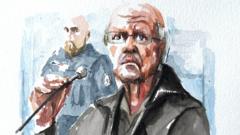In a significant move, President Emmanuel Macron has announced the formation of a French-Haitian commission tasked with studying the complex history between the two nations and the impact of a controversial debt that has shaped Haiti's present struggles.
France and Haiti Collaborate on Historical Commission for Healing and Understanding

France and Haiti Collaborate on Historical Commission for Healing and Understanding
A new commission to explore the historical debt imposed on Haiti by France aims to foster reconciliation and address the legacies of colonialism.
France's President Emmanuel Macron has announced a groundbreaking initiative to create a commission comprised of both French and Haitian historians, aimed at examining the profound historical relationship between France and Haiti. This panel will specifically investigate the enormous debt imposed on Haiti when it was forced to compensate French slave owners in exchange for its independence in 1804. Originally amounting to 150 million gold francs—later reduced to 90 million—the debt was not fully repaid until 1947, a burden that many believe has played a central role in Haiti's persistent poverty and instability.
The ramifications of this debt continue to elicit significant outrage among Haitians, fueling calls for France to consider reparative justice. While Macron's statements highlight the intent of the commission to generate recommendations for both governments towards a more harmonious coexistence, there is uncertainty surrounding the potential for financial reparations as part of the proposed discussions.
In recent years, French administrations have recognized the historical injustices of slavery but have shied away from addressing the contentious issue of the independence debt directly. Macron recently characterized the debt as an "injustice" that hindered the freedom of Haiti from its very inception. He emphasized that the commission's work will be essential in shaping future relations.
Monique Clesca, a prominent Haitian writer, remarked on France's waning influence globally—particularly in Africa—and suggested that openly acknowledging the debt's injustice could be a step towards mending historical grievances. While such recognition cannot undo past harm, it might provide a path to healing.
Amid ongoing economic turmoil and escalating gang violence in Haiti, the transitional presidential council aims to garner democratic stability, yet progress has been slow. With over 5,500 lives lost to gang violence in the past year alone, the stakes for both nations remain high as they grapple with the intertwined legacies of their past.




















